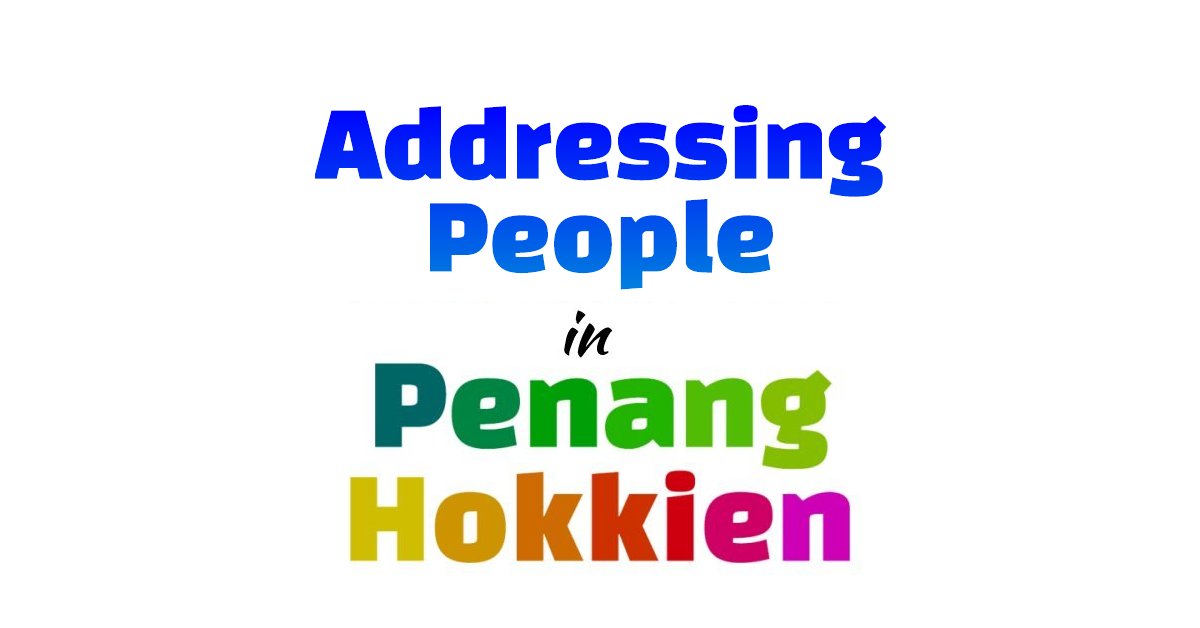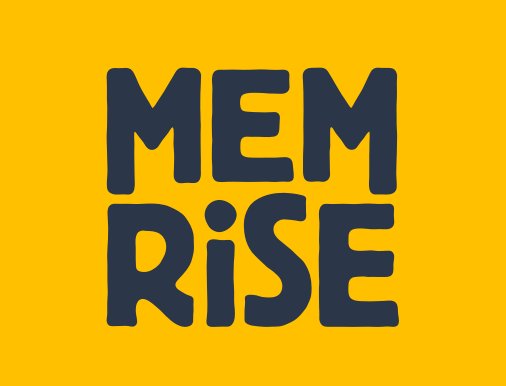
Penang Hokkien has a set of polite words to address strangers depending on your own station in society. Some of these addresses are derivatives of other languages, such as Ah Boy, which is obviously on permanent loan from English.
Many families still call each member by their address, limited not only to Mom and Dad, but extends to 2nd-Elder-Uncle-on-the-Maternal-Side, Wife-of-the-Eldest-Uncle, and so on. We will visit those complicated addresses for distant relatives further on in our lesson. For now, let's concentrate only on the addresses you will be using most frequently, that is, terms to address immediate family members and strangers.
Parents & Grandparents
- Pa3 Pa1 [pa-pa]
 : (noun) Dad
: (noun) Dad - Ma3 Ma1 [ma-ma]
 : (noun) Mom
: (noun) Mom - Ah3 Pa1 [a-pa]
 : (noun) Dad
: (noun) Dad - Ah3 Mak3 [a-mak]
 : (noun) Mom
: (noun) Mom - Ah3 Kong1 [a-kɔŋ]
 : (noun) Grandpa
: (noun) Grandpa - Ah3 Ma4 [a-ma]
 : (noun) Grandma
: (noun) Grandma
Elder Brothers & Sisters
- Ko3 Ko1 [ko-ko]
 : (noun) Elder brother
: (noun) Elder brother - Chee3 Chee4 [tsi-tsi]
 : (noun) Elder sister
: (noun) Elder sister - Tua33 Ko1 [tua-ko]
 : (noun) Elder Brother
: (noun) Elder Brother - Tua33 Chee4 [tua-tsi]
 : (noun) Elder Sister
: (noun) Elder Sister - Jee33 Ko1 [dzi-ko]
 : (noun) Second Eldest Brother
: (noun) Second Eldest Brother - Jee33 Chee4 [dzi-tsi]
 : (noun) Second Eldest Sister
: (noun) Second Eldest Sister
Strangers
- Ah3 Ba2 [a-ba]
 : (noun) Young Man, used for addressing youths who are younger than you.
: (noun) Young Man, used for addressing youths who are younger than you. - Ah3 Boy2 [a-bɔi]
 : (noun) Lad, used for addressing boys up to teenage years.
: (noun) Lad, used for addressing boys up to teenage years. - Ah4 Nya2 [a-ĩa]
 : (noun) Miss (used for addressing strangers)
: (noun) Miss (used for addressing strangers) - Tau3ke1/Tow3kay1 [tau-kɛ]
 : (noun) Boss (used for address a person with reverence)
: (noun) Boss (used for address a person with reverence) - Tau3ke3 Soh4/Tow3kay3 Soh4 [tau-kɛ-so]
 : (noun) Lady Boss (used for addressing a female with reverence)
: (noun) Lady Boss (used for addressing a female with reverence) - Ah3 Ko1 [a-ko]
 : (noun) Mister (literally "Brother"or "Bro"), used for addressing men of the same age or older than you.
: (noun) Mister (literally "Brother"or "Bro"), used for addressing men of the same age or older than you. - Ah3 Chee4 [a-tsi]
 : (noun) Miss (literally "Sister" or "Sis"), used for addressing ladies of the same age or older than you.
: (noun) Miss (literally "Sister" or "Sis"), used for addressing ladies of the same age or older than you. - Ah3 Cek3 [a-tsek]
 : (noun) "Uncle", when addressing men who are in their fifties and above.
: (noun) "Uncle", when addressing men who are in their fifties and above. - Ah3 Paek3 [a-pɛk]
 : (noun) "Uncle", when addressing men who are in their seventies or older.
: (noun) "Uncle", when addressing men who are in their seventies or older. - Ah3 Ee2 [a-i]
 : (noun) "Auntie", when addressing women who are in their fifties and above.
: (noun) "Auntie", when addressing women who are in their fifties and above.
When talking to a stranger, such as the salesgirl in the department store or the hawker at the market, it is polite to use the forms stated above. As a tourist or visitor who isn't Chinese, if you master this, I guarantee you will win instant admiration. (Feel free to ask me whenever you are not sure).
Address a person Ah Ba only if he is a young man who is younger than yourself (otherwise he will be insulted). Similarly Ah Nya is used for young woman who is younger than yourself. If the male person is merely a teenager or younger, you can call him Ah Boy.
You may call a person Tauke (also written Towkay) out of politeness if he is of the same age as yourself or older, particularly if he appears to be holding a somewhat authoritative position. It is fine to call the butcher or vegetable hawker at the market Tauke/Towkay.
On the other hand, reserve using Tauke Soh/Towkay Soh for women who is obviously the lady boss or the wife of the boss, as in a restaurant or business.
A cordial way to call strangers, particularly if you need to stop someone in the streets to ask for directions, is to call the person Ah Ko ("Brother") or Ah Chee ("Sister"). You are free to use these terms even when talking to strangers who are slightly younger than you, although the terms literally mean "elder brother" and "elder sister".
In Penang Hokkien, "Ah3" is commonly prefixed to addresses, to denote intimacy or congeniality. It is often attached to people's names. For example, a man whose name is Weng Seng may be known to his friends and family members as Ah Seng2. It is also used on surnames, Ah Lee4, Ah Yeap4, etc. It is not uncommon to hear the Chief Minister, Lim1 Guan1 Eng4, being referred affectionately as Ah Eng1. It is even used with English names, hence Ah Joe, Ah John, Ah Chris, though only with monosyllable English names.
Penang Hokkien has lately borrowed from Singapore Hokkien the term "Ah Beng2", which is used to refer to an unsophisticated person, the "Phua Choo Kang" type. This despite the word "beng2" meaning "bright". Hence Ah Beng can be translated in jest as "Mr Bright".
Practice pronouncing the various terms of address on this page, keeping in mind the lesson on Penang Hokkien intonation as you articulate each syllable.
Language Learning Tools
Use the following language learning tools to learn Penang Hokkien!Learn Penang Hokkien with uTalk
This app opens the door to over 150 languages.Return to Penang Hokkien Resources
 Latest updates on Penang Travel Tips
Latest updates on Penang Travel Tips
 Map of Roads in Penang
Map of Roads in Penang
Looking for information on Penang? Use this Map of Roads in Penang to zoom in on information about Penang, brought to you road by road.Disclaimer
Please use the information on this page as guidance only. The author endeavours to update the information on this page from time to time, but regrets any inaccuracies if there be any.
Copyright © 2003-2025 Timothy Tye. All Rights Reserved.

 Go Back
Go Back
